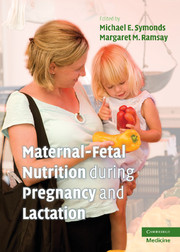Book contents
- Maternal-Fetal Nutrition during Pregnancy and Lactation
- Maternal-Fetal Nutrition during Pregnancy and Lactation
- Copyright page
- Contents
- Contributors
- Section 1 Nutritional regulation and requirements for pregnancy and fetal growth
- Section 2 Nutritional regulation and requirements for lactation and infant growth
- Chapter 7 Macronutrients for lactation and infant growth
- Chapter 8 Changes in nutrient requirements with age after birth
- Chapter 9 Comparison between preterm and term infants
- Chapter 10 Influences of timing and duration of formula feeding on infant growth
- Chapter 11 Maternal and offspring benefits of breast-feeding
- Section 3 Specialized requirements
- Index
Chapter 11 - Maternal and offspring benefits of breast-feeding
from Section 2 - Nutritional regulation and requirements for lactation and infant growth
Published online by Cambridge University Press: 26 February 2010
- Maternal-Fetal Nutrition during Pregnancy and Lactation
- Maternal-Fetal Nutrition during Pregnancy and Lactation
- Copyright page
- Contents
- Contributors
- Section 1 Nutritional regulation and requirements for pregnancy and fetal growth
- Section 2 Nutritional regulation and requirements for lactation and infant growth
- Chapter 7 Macronutrients for lactation and infant growth
- Chapter 8 Changes in nutrient requirements with age after birth
- Chapter 9 Comparison between preterm and term infants
- Chapter 10 Influences of timing and duration of formula feeding on infant growth
- Chapter 11 Maternal and offspring benefits of breast-feeding
- Section 3 Specialized requirements
- Index
Summary
Keywords
- Type
- Chapter
- Information
- Maternal-Fetal Nutrition During Pregnancy and Lactation , pp. 106 - 118Publisher: Cambridge University PressPrint publication year: 2010
- 1
- Cited by



